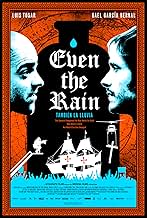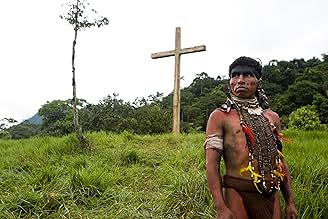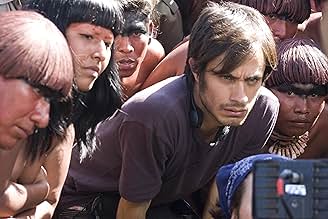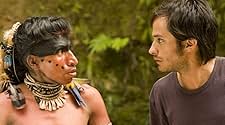IMDb RATING
7.4/10
15K
YOUR RATING
As a director and his crew shoot a controversial film about Christopher Columbus in Cochabamba, Bolivia, local people rise up against plans to privatize the water supply.As a director and his crew shoot a controversial film about Christopher Columbus in Cochabamba, Bolivia, local people rise up against plans to privatize the water supply.As a director and his crew shoot a controversial film about Christopher Columbus in Cochabamba, Bolivia, local people rise up against plans to privatize the water supply.
- Awards
- 22 wins & 17 nominations total
- Director
- Writer
- All cast & crew
- Production, box office & more at IMDbPro
Featured reviews
I really enjoyed the film "Even in the Rain" because the movie had two stories going side by side. It was like a movie inside a movie, which was one thing that I really enjoyed about the movie. Overall the movie was very easy to understand. There might have been one scene that was not that clear to me but I got the general idea of it anyways so it was not really a big problem. If this was an American film the problem would have been solved in the movie, so it different from American films. To my understanding the problem was not resolved in this film. This film taught me how people in other parts of the world are living today and that people do not have the things that we take for granted all time. Also this film sort of taught us about the past which I taught was very interesting. It showed us how the British were treating the Natives. If was the director of this film I would have made it so at the end of the film everyone had water.
Even the Rain (2010)
There are so many stunning, powerful, dramatic, believable moments to this hard hitting film, you wish so much that there weren't a few unreasonable gaffes to the plot and characters. It's frustrating when a film is almost amazing, because you are reminded of what it was not.
But also what it is, which is pretty thrilling and clever.
First, the contemporary setting is based quite closely on the true events of local Bolivians in the third largest city of the country, Cochabamba, fighting for rights to their own water supply. A private (Euro-U.S.) firm has cornered water rights and when the locals try to use their own handmade supply system the police come and interfere. It's maddening to the point of anger on both sides of the screen. In a way, this local uprising against injustice is the movie, the core of the events.
But what makes it actually fabulous is the way it told through the eyes and cameras of a large film crew working on a movie about Christopher Columbus arriving on the shores of America and mistreating the natives. Yes, a parallel that is obvious but handled with dramatic aplomb. There are many moments showing the shooting of the film, and it transports the viewer instantly and beautifully to the Columbus events, which are epic in their own way. But the characters are part professional actors from other countries and part local (and underpaid) extras, some of whom are involved in the water protests when not filming.
So there are several layers of action, tightly interwoven. The disdain and fear of some of the outsiders is believable (the man playing Columbus, Karra Elejalde, is amazing, world weary and tough, taking both sides as needed). Some of the circa 1500 history of resistance by the natives and even the brave defense of the natives by a Spanish priest is inspiring. And the way it still applies 500 years later (500 years!) is depressing. And energizing.
There are some other small problems, maybe the result of editing down too much later, such as the inclusion at the start of black and white video footage, a documentation of the filming, that you think will then become news footage (or not) but then it just disappears as a component of the film, completely, for no reason. And then the tumult of the last half hour with riots and roadblocks is great stuff, really well done, but so highly improbable you have to just write it off to generous screen writing. We aren't really able to believe the wholehearted change of attitude of the producer (played with intensity by Luis Tosar), but it makes for great interpersonal (and sympathetic) dramatics. And finally the director of the movie within the movie is played by the ever beautiful Gael Garcia Bernal, but in fact he's too weak and thoughtful a type to be directing this sprawling and frankly unmanageable movie about Columbus.
But these objections actually only came up for me later, thinking back. While immersed, I was really immersed and impressed. It's an ambitious, smart, and pertinent movie, with great and enjoyable complexity.
There are so many stunning, powerful, dramatic, believable moments to this hard hitting film, you wish so much that there weren't a few unreasonable gaffes to the plot and characters. It's frustrating when a film is almost amazing, because you are reminded of what it was not.
But also what it is, which is pretty thrilling and clever.
First, the contemporary setting is based quite closely on the true events of local Bolivians in the third largest city of the country, Cochabamba, fighting for rights to their own water supply. A private (Euro-U.S.) firm has cornered water rights and when the locals try to use their own handmade supply system the police come and interfere. It's maddening to the point of anger on both sides of the screen. In a way, this local uprising against injustice is the movie, the core of the events.
But what makes it actually fabulous is the way it told through the eyes and cameras of a large film crew working on a movie about Christopher Columbus arriving on the shores of America and mistreating the natives. Yes, a parallel that is obvious but handled with dramatic aplomb. There are many moments showing the shooting of the film, and it transports the viewer instantly and beautifully to the Columbus events, which are epic in their own way. But the characters are part professional actors from other countries and part local (and underpaid) extras, some of whom are involved in the water protests when not filming.
So there are several layers of action, tightly interwoven. The disdain and fear of some of the outsiders is believable (the man playing Columbus, Karra Elejalde, is amazing, world weary and tough, taking both sides as needed). Some of the circa 1500 history of resistance by the natives and even the brave defense of the natives by a Spanish priest is inspiring. And the way it still applies 500 years later (500 years!) is depressing. And energizing.
There are some other small problems, maybe the result of editing down too much later, such as the inclusion at the start of black and white video footage, a documentation of the filming, that you think will then become news footage (or not) but then it just disappears as a component of the film, completely, for no reason. And then the tumult of the last half hour with riots and roadblocks is great stuff, really well done, but so highly improbable you have to just write it off to generous screen writing. We aren't really able to believe the wholehearted change of attitude of the producer (played with intensity by Luis Tosar), but it makes for great interpersonal (and sympathetic) dramatics. And finally the director of the movie within the movie is played by the ever beautiful Gael Garcia Bernal, but in fact he's too weak and thoughtful a type to be directing this sprawling and frankly unmanageable movie about Columbus.
But these objections actually only came up for me later, thinking back. While immersed, I was really immersed and impressed. It's an ambitious, smart, and pertinent movie, with great and enjoyable complexity.
I found it very easy to identify with all of the main players thanks to some great performances from all involved and also a really nicely written script. It's really well shot with nice big, easily legible subtitles (more like this please foreign filmmakers!). It was interesting to see a film set in that region, we don't see very much from that part of the world. There are also some historical facts about the conquistadors that I wasn't aware of and so it even educated be a little! I love the way it slowly dawns on the crew that the mistakes made 500 years previously are still being made today! Over all, I found it well worth a look and it's one I would certainly look at again sometime.
SteelMonster's verdict: RECOMMENDED
My score: 8.3/10
You can find an expanded version of this review on my blog: Thoughts of a SteelMonster.
SteelMonster's verdict: RECOMMENDED
My score: 8.3/10
You can find an expanded version of this review on my blog: Thoughts of a SteelMonster.
EVEN THE RAIN (También la lluvia) is a brilliant metaphor of a story written by Paul Laverty based on an actual event and directed with considerable skill by Icíar Bollaín, the great Spanish actress, writer and director. This film is one of those rare 'docudramas' that bring to light historical 'secrets' that beg to be shared. In 2000 an American water company bought the water supply from the Bolivian government and the citizens of Bolivia were banned from collecting rainwater which had become corporate property. This resulted in a violent protest against the government by the indigenous Indians and the citizenry of Cochambamba, Bolivia who claimed their rights to the natural gifts of nature - even the rain. Laverty and Bollaín expose this injustice through a well-conceived story within a story.
Spanish film director Sebastián (Gael García Bernal), his cynical producer Costa (Luis Tosar), and crew including Antón (Karra Elejalde) have come to Cochabamba, Bolivia to shoot their film about Christopher Columbus (played by actor Antón - Karra Elejalde) and his first explorations, revealing the way the Spaniards treated the native Indians: Costa has chosen the place because he can get cheap labor in using local actors and extras to keep within the small budget of the film. Sebastián is the compassionate one who wants the Indians treated well, hiring a mouthy young Indian named Hatuey/Daniel (Juan Carlos Aduviri) when he claims he and his family are being unjustly overlooked as actor candidates. The filming goes well, with the exception of some minor glitches for particular scenes the Indians find too dangerous, until a conflict develops over the governmental privatization of the water supply. Daniel becomes an activist against the government who plan a 300% increase in price of water - the average daily income for the Indians is $2. a day! - and the conditions in the city become unfriendly for the film to continue. Bloody violence and chaos breakout and many citizens are being killed or jailed. It is at this point that the caring Sebastián finally decides that he and his crew must flee, and with some role reversal, Costa stays behind to protect Daniel's family.
According to Bollaín, 'It was the gold 500 years ago, and now it's the water, which is the gold of the 21st century. Before it was the Crown of Spain and the pope who approved the conquest. Now it is the new theologians, the IMF and the World Bank. Again it's the word from above, saying, 'This is right.' The Spanish filmmakers in the film-within-a-film are caught in the middle. They have the attitude of neo-conquerors - they go there because it's cheap. But they're also trying to make a film that casts a different look on the conquest. And it's an adventure.'
Iciar Bollaín directs this epic film with great dignity and with a keen observation of how history, even inadvertently, repeats itself. The cinematography by Alex Catalán and the musical score by Alberto Iglesias add immeasurably to the film's success. The cast of extras is exceptional and very well directed. Both Gael García Bernal and Luis Tosar deliver intensely considered performances as does Juan Carlos Aduviri as the key central figure Daniel. Hopefully this film, nominated for Best Foreign Film in the 2010 Academy Awards. In Spanish with English subtitles.
Grady Harp
Spanish film director Sebastián (Gael García Bernal), his cynical producer Costa (Luis Tosar), and crew including Antón (Karra Elejalde) have come to Cochabamba, Bolivia to shoot their film about Christopher Columbus (played by actor Antón - Karra Elejalde) and his first explorations, revealing the way the Spaniards treated the native Indians: Costa has chosen the place because he can get cheap labor in using local actors and extras to keep within the small budget of the film. Sebastián is the compassionate one who wants the Indians treated well, hiring a mouthy young Indian named Hatuey/Daniel (Juan Carlos Aduviri) when he claims he and his family are being unjustly overlooked as actor candidates. The filming goes well, with the exception of some minor glitches for particular scenes the Indians find too dangerous, until a conflict develops over the governmental privatization of the water supply. Daniel becomes an activist against the government who plan a 300% increase in price of water - the average daily income for the Indians is $2. a day! - and the conditions in the city become unfriendly for the film to continue. Bloody violence and chaos breakout and many citizens are being killed or jailed. It is at this point that the caring Sebastián finally decides that he and his crew must flee, and with some role reversal, Costa stays behind to protect Daniel's family.
According to Bollaín, 'It was the gold 500 years ago, and now it's the water, which is the gold of the 21st century. Before it was the Crown of Spain and the pope who approved the conquest. Now it is the new theologians, the IMF and the World Bank. Again it's the word from above, saying, 'This is right.' The Spanish filmmakers in the film-within-a-film are caught in the middle. They have the attitude of neo-conquerors - they go there because it's cheap. But they're also trying to make a film that casts a different look on the conquest. And it's an adventure.'
Iciar Bollaín directs this epic film with great dignity and with a keen observation of how history, even inadvertently, repeats itself. The cinematography by Alex Catalán and the musical score by Alberto Iglesias add immeasurably to the film's success. The cast of extras is exceptional and very well directed. Both Gael García Bernal and Luis Tosar deliver intensely considered performances as does Juan Carlos Aduviri as the key central figure Daniel. Hopefully this film, nominated for Best Foreign Film in the 2010 Academy Awards. In Spanish with English subtitles.
Grady Harp
I first got wind of the political situation in Bolivia around the time of the 2003 protests, and then during the 2005 presidential election that brought coca farmer Evo Morales to power, making him the country's first indigenous president. Oliver Stone's documentary "South of the Border" partly told the story of the World Bank-inspired water privatization in Bolivia: the World Bank forced Bolivia's government to pass a law making it illegal for people to collect rain in buckets since it would have broken the monopoly on water ownership.
Icíar Bollaín's "También la lluvia" ("Even the Rain" in English) tells the story of the privatization, contrasting it with Christopher Columbus's genocide against the Indians. Filmmakers Sebastian (Gael García Bernal) and Costa (Luis Tosar) arrive in Cochabamba to make a movie about Columbus's arrival in the Americas, and the Taino Indians' subsequent rebellion against the occupation. But the events depicted in their movie begin to play out in real life: when the government sets out to privatize the water supply, the actor playing Taino leader Hatuey is one of the leaders of the protests.
The movie - which is dedicated to Howard Zinn - obviously has as its main purpose to show the parallels between indigenous resistance 500 years ago and today. But more than anything, it should offer incite into the roots of the wave of progressive leaders who rose to power in South America during the first decade of the 21st century. I definitely recommend it.
Icíar Bollaín's "También la lluvia" ("Even the Rain" in English) tells the story of the privatization, contrasting it with Christopher Columbus's genocide against the Indians. Filmmakers Sebastian (Gael García Bernal) and Costa (Luis Tosar) arrive in Cochabamba to make a movie about Columbus's arrival in the Americas, and the Taino Indians' subsequent rebellion against the occupation. But the events depicted in their movie begin to play out in real life: when the government sets out to privatize the water supply, the actor playing Taino leader Hatuey is one of the leaders of the protests.
The movie - which is dedicated to Howard Zinn - obviously has as its main purpose to show the parallels between indigenous resistance 500 years ago and today. But more than anything, it should offer incite into the roots of the wave of progressive leaders who rose to power in South America during the first decade of the 21st century. I definitely recommend it.
Did you know
- TriviaThe scene where the little girl sees herself on screen was kind of a self homage by director/actress Icíar Bollaín. She wanted to transmit her first impression when she saw herself on screen being a teenager.
- ConnectionsFeatured in Ebert Presents: At the Movies: Episode #1.6 (2011)
- How long is Even the Rain?Powered by Alexa
Details
Box office
- Gross US & Canada
- $518,017
- Opening weekend US & Canada
- $53,730
- Feb 20, 2011
- Gross worldwide
- $7,313,485
- Runtime
- 1h 43m(103 min)
- Color
- Sound mix
- Aspect ratio
- 2.35 : 1
Contribute to this page
Suggest an edit or add missing content



















